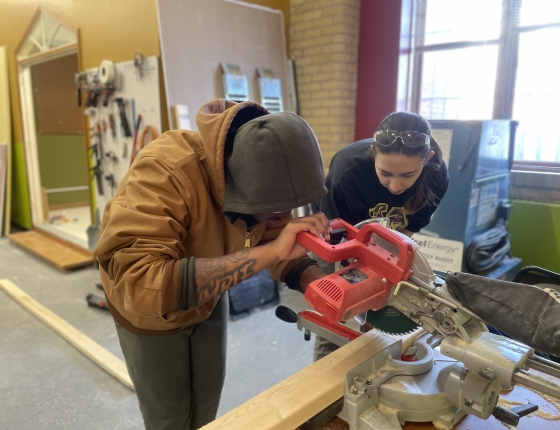In 2021, Center for Energy and Environment (CEE) established its career training program to create a diverse and knowledgeable workforce that was prepared for our changing energy future. The program prioritizes the training of BIPOC individuals and women as two groups that are historically under-represented in the field. The program is funded by Xcel Energy as part of its income-qualified portfolio and, following the program’s early success, Ramsey County and the City of Saint Paul awarded CEE funding in 2023 to expand the training opportunities into the HVAC field and greater Twin Cities metro.
With clean energy jobs growing nearly five times faster than jobs in other fields in Minnesota, this program continues to be an important method to prepare the workforce for the future while supporting CEE’s mission.
Energy efficiency career opportunities
Finding a job can be overwhelming, especially if you’re entering a new field, but the clean energy field is large and growing, leaving you with many opportunities to find a career that suits your interests and goals.
Every career training participant receives training in relevant job skills, like building science principles and math for construction, and career readiness skills, like resume writing and interviewing. Participants can also earn a certification from the Building Performance Institute (BPI), which is the leading standards and credentialing organization in the energy efficiency industry.
After this training, participants are prepared for several careers in residential trades, like energy auditor, HVAC installer, or insulation installer.
Energy Auditor
Energy auditors use building science knowledge to understand how efficient a building is. Typically, auditors work with homeowners or renters in residential buildings to understand any comfort or efficiency concerns they have. Then they conduct several types of tests, like blower door or combustion safety tests, that provide additional information on the home. Based on their findings, energy auditors may install energy-saving materials during their visit. Finally, they educate the homeowner on what they found, what those findings mean for efficiency and comfort, and what upgrades might address any areas of concern. To do this job, you’ll need your Building Analyst Technician (BA-T) certification from BPI. Other certifications, like Quality Control Inspector (QCI), may offer career growth in this field, including higher level auditor roles, trainer roles, and more.
HVAC Installer
HVAC installers work with homeowners or business owners to install and maintain or service heating, ventilation, and air conditioning systems that fit their needs. This process requires an understanding of the systems themselves, as well as the building and other factors that may affect performance, like efficiency or customer use. Like with energy auditing and insulation work, every job is different. Depending on whether the installer is designing a new HVAC system, like in new construction projects, or replacing an existing system, their day may look different. HVAC installers must understand both the HVAC system they’re installing, and the ductwork required to ensure the units run correctly. This may involve installing indoor and outdoor components, fabricating and installing duct fittings, completing paperwork, and speaking to the customer. From this role, you can expand your career into being an installer, service technician, manager, trainer, salesperson, or business owner. To get started, you should receive your EPA Section 608 Technician Certification.
Insulation Installer
Insulation installers make sure buildings are property insulated and air sealed to increase energy efficiency and occupant comfort by reducing temperature swings inside the space. The needs of each space will depend on factors like the previous installation, type of space and its use, and region’s climate. Based on their findings and the customer’s preferences and goals, the insulation installer will air seal the space and install different types of insulation. As they replace or install the insulation, installers should also be prepared to consider the ventilation in the space and the insulation's R-value, which measures how well it performs. For this job, you will need the BPI Air Leakage Control Installer certification. From this role, you can expand into a crew leader, contractor, or business owner role.
Open new career doors with CEE
If you’re ready for a change, why not train for a new career? After completing their training, we’ve had graduates go on to become carpenters, electrician apprentices, HVAC technicians, and more. If you’re ready to explore your energy career options, visit our website to learn more and share your information.
